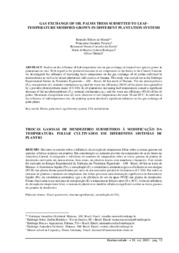Gas exchange of oil palms tress submitted to leaf-temperature modified grown in different plantation systems.
Gas exchange of oil palms tress submitted to leaf-temperature modified grown in different plantation systems.
Author(s): MORAIS, R. R. de; TEIXEIRA, W. G.; ROCHA, R. N. C. da; RODRIGUES, M. do R. L.; DÜNISCH, O.
Summary: Studies on the influence of leaf temperature rise on gas exchange in tropical tree species grown in plantations are rare. With regard to the predicted increase in air temperature in the future in the Central Amazon, we investigated the influence of increasing leave temperature on the gas exchange of oil palms cultivated in monocultures as well as in mixed plantations with cassava or banana. This study was carried out at the Embrapa Experimental Station in Presidente Figueiredo - AM - Brazil, 60 km north of Manaus. The net photosynthesis (Pn), transpiration (E), stomatal conductance (gs) and the water use efficiency (WUE) of the plants were quantified by a portable photosynthesis meter (CI-340). In all plantations increasing leaf temperatures caused a significant decrease of the net photosynthesis (Pn), stomatal conductance (gs), and the water use efficiency (WUE) of the oil palms. Maximum transpiration rates (E) were observed at leaf temperatures between 38 and 46°C. In addition to the influence of leaf temperature rise, the planting system also had a significant influence on the gas exchange of palm plants.
Publication year: 2020
Types of publication: Journal article
Unit: Embrapa Western Amazon
Observation
Some of Embrapa's publications are published as ePub files. To read them, use or download one of the following free software options to your computer or mobile device. Android: Google Play Books; IOS: iBooks; Windows and Linux: Calibre.
Access other publications
Access the Agricultural Research Database (BDPA) to consult Embrapa's full library collection and records.
Visit Embrapa Bookstore to purchase books and other publications sold by Embrapa.

